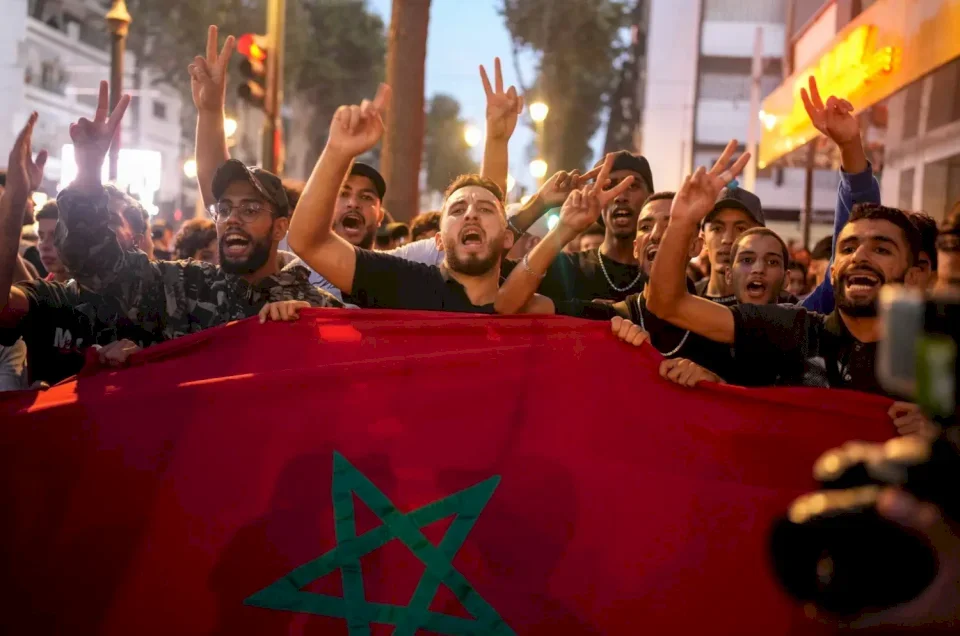After a 10-day break, young Moroccans gathered in Rabat in front of parliament on Saturday, October 18, 2025, reviving protests organized by the online youth group GenZ 212.
The movement, which started in late September, focuses on overhauling education and healthcare systems, rooting out corruption, and easing the economic pressures weighing on daily life.
Reda, a participant, explained the gathering’s purpose. “This is about uniting our efforts and planning future actions,” he said. “It tells the government we’re not stopping.
We’ll keep pushing until real changes happen not just promises, but actions that make our struggles feel meaningful.”
The resurgence came shortly after King Mohammed VI spoke to parliament 10 days earlier, addressing youth job opportunities and improvements in public services. However, many protesters felt his words fell short, lacking direct acknowledgment of their demands and concrete plans.
Roots of the Movement
GenZ 212, named after Morocco’s country code, emerged from frustration over government priorities. Billions allocated for events like the 2030 FIFA World Cup and 2025 Africa Cup of Nations contrast sharply with underfunded hospitals and schools.
A tragic incident in Agadir, where eight pregnant women died during childbirth due to poor facilities, ignited the spark in late September.
Using platforms like Discord (with over 250,000 members), TikTok, and Instagram, the decentralized group mobilized thousands across cities including Rabat, Casablanca, Tangier, Fez, and Agadir.
Youth unemployment, hovering at 35.8% nationally and 48% in urban areas, fuels the anger. Morocco ranks 120th in the UN Human Development Index, highlighting deep inequalities.
Challenges and Violence
Early protests were mostly peaceful, but tensions escalated by October 1. In Lqliaa near Agadir, two people died when security forces fired in self-defense during an alleged station attack, marking the first fatalities.
Three deaths were reported overall, with over 500 arrests, including minors, and 263 security personnel injured. In Sale, protesters set police cars and banks ablaze, leading to 409 detentions.
GenZ 212 condemned violence, stressing nonviolent tactics. The Moroccan Human Rights Organization called for releasing detainees and ensuring fair trials, citing constitutional rights to peaceful assembly.
Hope and Uncertainty
Protester Naji reflected on the future. “It’s early to predict outcomes,” he said. “Politics involves many factors, but we’re optimistic. Change might come soon.” Participants insist the pause didn’t weaken momentum; social media kept engagement high, with thousands joining online discussions.
Inspired by youth-led uprisings in Nepal and Madagascar, where leaders resigned or dissolved governments, GenZ 212 demands the current administration’s resignation for failing social needs. They cite Article 47 of the constitution, empowering the king to appoint or dismiss officials.
Prime Minister Aziz Akhannouch’s coalition offered dialogue, but protesters seek tangible reforms. The movement’s rapid growth from a small Discord server to 250,000 members, shows digital tools’ power in mobilizing a generation tired of unfulfilled promises.
Broader Implications
These protests, the largest in years, challenge Morocco’s stability, a North African nation seen as relatively calm. With 30% of the population aged 15-34, youth voices demand a shift from infrastructure spending to social investments.
As demonstrations continue, the government faces pressure to respond effectively, balancing security with reform to prevent escalation. For now, Gen Z’s defiance signals a push for a fairer future, where young sacrifices yield real progress.
READ ALSO: Simone Gbagbo Campaigns for Ivory Coast Presidency




















